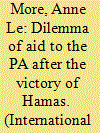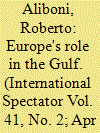| Srl | Item |
| 1 |
ID:
072156


|
|
|
|
|
| Publication |
2006.
|
| Summary/Abstract |
The article analyses both the dynamics of change affecting the Palestinian political and governing systems and the relationship between internal structures and processes - such as PA reform - and external ones, specifically the peace process and relations with Israel and the international community. A decisive shift has taken place in Palestinian politics. The ascent of Hamas represents a radical break with the legacy of former PLO Chairman and PA President Arafat and the political culture of PLO "returnees" who came with him from their Tunisian exile. Contrary to common perceptions, the success of Hamas in office may be critical for the deepening of Palestinian democracy and restructuring of good governance.
|
|
|
|
|
|
|
|
|
|
|
|
|
|
|
|
| 2 |
ID:
072157


|
|
|
|
|
| Publication |
2006.
|
| Summary/Abstract |
At the beginning of the Oslo process aid to the Palestinian population was aimed at sustaining the peace endeavour, economic and social development, and the PA process of nation-building. Hardly any of these objectives have been achieved as donor funds were gradually shifted to emergency and humanitarian assistance during the nineties and especially after 2002. This has had many perverse effects, notably deepening Palestinian dependency on foreign aid, sustaining Israel's actions in the Occupied Territories and violations of international law, and diminishing the prospect of a viable two-state solution. Nevertheless, the Quartet's decision to stop funding the now Hamas-led administration could have potentially disastrous effects. Therefore, it seems unlikely that donors will use this crisis as an opportunity to reassess their failed "aid for peace" strategy towards the Israeli-Palestinian peace process.
|
|
|
|
|
|
|
|
|
|
|
|
|
|
|
|
| 3 |
ID:
072153


|
|
|
|
|
| Publication |
2006.
|
| Summary/Abstract |
With the belief that the EU would act as a catalyst in the period prior to the accession of the (Greek) Cypriot government to the European club on 1 May 2004 having ended in disappointment, this article looks at the more complex internal/external dynamics now at play in the current milieu. A key question raised is the extent to which the EU can effectively prevent the potential short-term negative effects emerging as a result of the its failure to realise its objectives for the north, from crystallising into further developments that could make reunification of the island impossible. To do this, it will have to exploit the opportunities that exist to facilitate movement towards reunification, a difficult but not impossible task if the EU takes into account the demands of all actors involved.
|
|
|
|
|
|
|
|
|
|
|
|
|
|
|
|
| 4 |
ID:
072154


|
|
|
|
|
| Publication |
2006.
|
| Summary/Abstract |
The Middle East and the Mediterranean have never been favourable to strong transatlantic convergence. The subject of terrorism has always brought to the fore differences between the United States and Europe, first in the Palestinian-Israeli context, then in the first wave of terrorism unleashed in the 1980s. This difference in assessment of the strategic importance of terrorism reflects on democracy promotion policies. In the US policy towards the Greater Middle East, democratisation as a response to terrorism is based on a pessimistic cultural assessment of the societies concerned. In the European view, democracy promotion plays a pivotal role in the Mediterranean and the Middle East but is regarded as a long term transformation requiring a number of cooperative responses on both sides.
|
|
|
|
|
|
|
|
|
|
|
|
|
|
|
|
| 5 |
ID:
072155


|
|
|
|
|
| Publication |
2006.
|
| Summary/Abstract |
After the assassination of Rafik Hariri on 14 February 2005, Lebanese society took to the streets in the "Lebanese Spring" with a series of demands, including the withdrawal of the Syrian army from Lebanon and parliamentary elections by June of that year. All demands were met, but during the election campaign, the old dilemmas of the confessionalised state once again took the upper hand. Behind these dilemmas are various political crises revealing of structural problems. The country is still in the throes of an all-engulfing crisis. In order to contain it, the leaders of the main political forces convened a "conference of national dialogue" in March 2006 - the first example of inter-Lebanese consultation without foreign trusteeship since 1975.
|
|
|
|
|
|
|
|
|
|
|
|
|
|
|
|
| 6 |
ID:
072152


|
|
|
|
|
| Publication |
2006.
|
| Summary/Abstract |
Security was the major concern of the Greek Cypriots when they voted down the "Annan V Plan " in March 2004. Yet, it can be argued that the strong and historically understandable security concerns of the Greek Cypriots were exaggerated and that many did not realise how difficult it would be for Turkey to intervene on the island again after entry into the EU. The article looks into the concerns of all players involved and provides a list of recommendations should an amended Annan Plan or a new settlement be designed in the future.
|
|
|
|
|
|
|
|
|
|
|
|
|
|
|
|
| 7 |
ID:
072158


|
|
|
|
|
| Publication |
2006.
|
| Summary/Abstract |
While both are convinced that "Islam is the solution", Islamists and al-Qaida represent two different views and political strategies. Islamist parties have militant grassroots participation and propose respect for the rule of law and concrete political and social projects. Moreover, the main Arab islamist parties have rejected violence as a means of political struggle. Hamas obtained the government majority by means of fair and free elections. Al-Qaida, instead, offers an undefined political platform: the restoration of an Islamic meta-state through the exhortation to Islamists to join the jihad. The political opportunities represented by the competition between Islamists and jihadists is well understood by some Arab regimes but seems to be less well understood in Western countries.
|
|
|
|
|
|
|
|
|
|
|
|
|
|
|
|